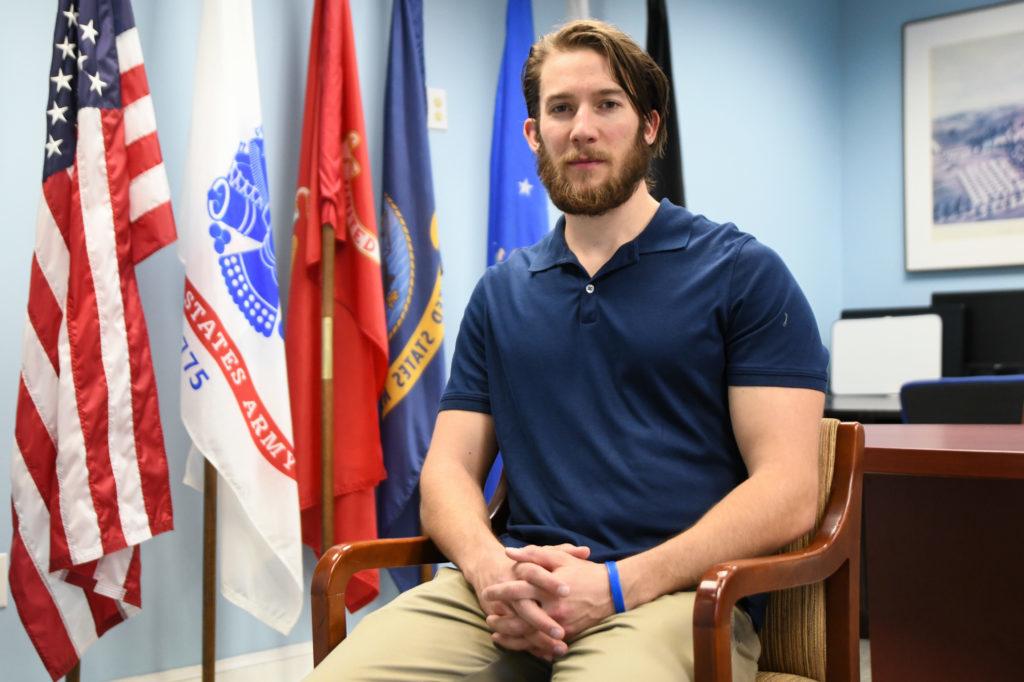Student veterans at GW are pressing administrators to give them first pick of classes.
A top veteran leader met with University President Thomas LeBlanc Thursday to request the policy change, which student veterans said would get rid of frustrations they face while trying to fulfill the credits needed to graduate. Former service members said priority registration would allow them to complete their education sooner, a pressure many face because they only receive federal benefits for a limited period of time.
University spokeswoman Maralee Csellar declined to say if the University was considering priority registration for student veterans. She said most students are able to complete all graduation requirements within eight semesters, but added that students have raised concerns about the “stress and complexity” associated with course registration at a series of listening sessions with administrators and trustees.
“It almost feels like a bait and switch when they get us in the door.”
“We will look into how we can improve the process and experience,” she said in an email.
Csellar declined to say if the Office of Military and Veteran Student Services is in favor of priority registration for veterans or what the challenges are for giving priority status to specific groups. She also did not say how officials determine whether to allow certain groups to register early for classes.
GW currently gives groups like honors students and students in the NROTC program priority registration, according to their respective websites.
Jesse Robinson, the president of the GW Veterans, a student veterans advocacy organization, said LeBlanc seemed receptive to the proposal at Thursday’s meeting and told them that he would look into the current policies.
Robinson said he and other veterans are under pressure to complete their degrees quickly because federal tuition support under the Post-9/11 G.I. Bill expires after 36 months. He said many veterans cannot afford to extend their education after the benefits run out, making it important that they get in to required classes.
Robinson, a sophomore, said he will have to spend an extra semester at GW because of scheduling problems, which he said is unfair.
“It almost feels like a bait and switch when they get us in the door,” he said. “GW veterans are trying to meet in the middle – whether it’s priority registration or not – just something that helps the veteran experience here so we don’t feel like we’re trapped and we weren’t just used for extra money for the school.”
Robinson said administrators seemed to be willing to help with classes or scheduling conflicts on a case-by-case basis, but much of those individual problems could be avoided by giving veterans priority registration.
“Why put us through hell trying to sign up for classes?” he said.
Last year, the national veterans advocacy organization, Student Veterans of America, helped lobby Congress to pass the Forever G.I. Bill, which almost included provisions requiring universities to give veterans priority course registration, but the measure was ultimately scrapped.
Will Hubbard, the vice president of government affairs at SVA, who helped write the legislation, said the bill did include a requirement for schools to list if they offer priority registration for veterans, which he said will help hold universities accountable if they aren’t receptive to community concerns.
“Independent institutions don’t like to be told what to do, but the fact is that they do receive federal funding,” he said.
Hubbard added that priority registration helps veterans get through college without having to take out additional loans. GW is expected to see an increase in the number of veterans because of the new legislation, which also offers expanded benefits for veterans.
In recent years, schools across the country have granted this perk to former service members – including some peer schools like Syracuse and George Mason universities.
Student veterans have advocated for a first pick at courses over the last few years. In 2014, Student Association senators lobbied for a policy change, but it wasn’t enacted.
GW’s ranking as a military-friendly school has dropped more than 50 spots since 2015, and staffing changes in the veterans affairs office have left some student veterans uncertain about the University’s dedication to the veteran community over the last year.
“As you know, priority enrollment is a critical feature for many of these young men and women who served their country.”
Hubbard said his organization helped veterans at GW by giving them advice on how to pitch priority registration to administrators and also helped draft a letter to send to officials asking for their support, which Robinson gave to LeBlanc at the end of their meeting.
In the letter SVA President and CEO Jared Lyon said giving priority registration to veterans will allow them to finish their degrees on time and keep their housing stipends from the VA. Lyon said with GW’s participation in the Yellow Ribbon program and other veteran benefits are helpful to veterans, but there is more the administration can do.
“As you know, priority enrollment is a critical feature for many of these young men and women who served their country,” Lyon said in the letter. “While many schools extend priority registration to student athletes, not nearly enough have provided this important support to student veterans.”





